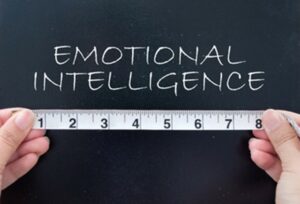Boost Effective Communication with Emotional Intelligence
Effective Communication with Emotional Intelligence
In today’s fast-paced world, Emotional Intelligence (EI) plays a pivotal role in effective communication. It is the ability to recognize and understand emotions in yourself and others and to use this awareness to guide thought and behavior. EI, which includes self-awareness, self-regulation, motivation, empathy, and social skills, is instrumental in effectively navigating personal and professional relationships. With EI, individuals can better manage stress, make informed decisions, and inspire others.
The process of developing EI involves practice, self-reflection, active listening, empathy, and effective communication. Individuals can enhance their relationships, leadership skills, and overall well-being by cultivating EI, leading to a more fulfilling and successful life. It’s important to note that EI is not an innate trait, but a skill that can be developed and strengthened over time with effort and dedication.
Emotional intelligence (EI) is a multifaceted concept encompassing various skills and competencies. Self-awareness is the foundation of EI, enabling individuals to recognize and understand their emotions, strengths, weaknesses, and motivations. Self-regulation follows, allowing individuals to control and manage their emotions, impulses, and behaviors. Motivation is another key aspect, as it drives individuals to achieve goals and pursue opportunities. Empathy is also essential, enabling individuals to understand and acknowledge others’ emotions. Practical social skills are critical in applying emotional awareness to interact and communicate with others.
Developing EI can significantly impact personal and professional life, improving relationships, decision-making, leadership, stress management, and overall well-being. EI can be developed and strengthened through practice, self-reflection, training, and experience, making it a valuable asset for individuals and organizations. Individuals can become more effective leaders, team players, and communicators by cultivating EI, leading to greater success and fulfillment.
“Emotional intelligence is not just about being nice; it’s about being smart.” – Dr. Travis Bradberry.
Developing emotional intelligence (EI) requires a combination of self-awareness, effort, and practice. It begins with recognizing and understanding your emotions, strengths, and weaknesses. This involves paying attention to your thoughts, feelings, and behaviors and being honest. Next, practice self-regulation by managing your emotions, impulses, and stress. Develop empathy by actively listening to others, asking open-ended questions, and seeking to understand their perspectives. Improve your social skills by communicating effectively, building solid relationships, and resolving conflicts constructively.
Additionally, seek feedback from trusted sources and be open to learning from criticism. Practice mindfulness, meditation, or journaling to increase self-awareness and emotional regulation. Finally, apply EI in daily life by making informed decisions, achieving goals, and building solid and meaningful relationships. With consistent effort and dedication, you can develop your emotional intelligence and enhance your personal and professional life.
“Good communication bridges confusion and clarity.” – Unknown.
Effective communication is the foundation of any successful relationship, personal or professional. It involves conveying ideas, thoughts, and messages, concisely, and respectfully, considering the audience’s perspective and needs. Good communication is about being understood and understanding others, actively listening to their concerns, and responding empathetically. It requires clarity, precision, and awareness of nonverbal cues, tone, and language.
Effective communication builds trust, resolves conflicts, and fosters collaboration, creativity, and productivity. By being approachable, open-minded, and adaptable, individuals can ensure that their message is conveyed accurately and efficiently, leading to stronger relationships, improved teamwork, and more tremendous success in all aspects of life. By working on practical communication skills, individuals can become better leaders, team players, and communicators, achieving their goals and positively impacting those around them.
“Effective communication is not about expressing yourself, it’s about being understood.” – Unknown
Effective communication builds trust, resolves conflicts, and stimulates collaboration, creativity, and productivity. It adapts to diverse contexts, audiences, and purposes, making it a vital skill for personal and professional growth. By mastering effective communication, individuals can navigate complex situations, achieve their goals, and positively impact others, leading to stronger relationships, improved teamwork, and more tremendous success in all aspects of life.
Effective Communication: Active listening
Active listening is a powerful communication technique that involves fully concentrating on and comprehending the message being conveyed by the speaker. It requires maintaining eye contact, avoiding interruptions, and setting aside biases and distractions. Active listeners use verbal and nonverbal cues, such as nodding and asking open-ended questions, to encourage the speaker to share their thoughts and feelings.
Active listeners ensure they understand the message accurately by paraphrasing and summarising what the speaker has said. This approach fosters a deeper connection, builds trust, and resolves conflicts. Active listening is not just about hearing words, but also about understanding the underlying emotions, needs, and concerns, making it an essential skill for effective communication, strong relationships, and personal and professional growth.
You can unlock the full potential of effective communication by being present, engaged, and fully attentive to the person speaking. This means putting away distractions, maintaining eye contact, and using verbal and nonverbal cues to show you’re actively listening. By doing so, you can build trust, foster deeper connections, and ensure that messages are conveyed clearly and accurately. Effective communication becomes a powerful tool for resolving conflicts, strengthening relationships, and achieving personal and professional success. When you unlock the power of effective communication, you open doors to new possibilities, collaborations, and understanding, leading to greater clarity, productivity, and fulfillment in all aspects of life.
“Communication is the foundation of any successful relationship.” – Unknown.
In the hectic world, effective communication in the workplace is a team leader, John, who needs to inform his team about a sudden change in project deadlines. Instead of sending a brief email, John calls a quick meeting and clearly explains the reasons for the change, answers questions and addresses concerns. He also asks for feedback and suggestions on how to adjust the project plan. By doing so, John ensures that everyone understands the new deadline, their roles, and responsibilities. He also encourages open communication, builds trust, and fosters a sense of teamwork. This approach helps to prevent misunderstandings, reduces stress, and motivates the team to work together to meet the new deadline, ultimately leading to successful project completion.
“Effective communication is 20% what you know and 80% how you feel about what you know.”
Here are some simple step-by-step tips for Effective communication:
-
Prepare:
- Clarify your message
- Consider your audience
- Choose the right medium (verbal, written, visual)
-
Be Clear:
- Use simple language
- Avoid jargon and technical terms
- Be concise and focused
-
Use Active Listening:
- Pay attention to the speaker
- Maintain eye contact
- Ask clarifying questions
-
Be Aware of Nonverbal Cues:
- Body language (posture, facial expressions)
- The tone of voice (pitch, volume, pace)
- Eye contact
-
Ask for Feedback:
- Encourage open dialogue
- Clarify understanding
- Adjust your message accordingly
-
Be Respectful:
- Use “I” statements instead of “you” statements
- Avoid interrupting or dismissing others
- Show empathy and understanding
-
Confirm Understanding:
- Summarize key points
- Ask for confirmation
- Ensure mutual understanding
-
Follow Up:
- Verify action items
- Provide updates
- Ensure progress and completion
By following these simple steps, you can improve your communication skills and ensure an effective exchange of information.
For example: Elaine, a project manager, needed to inform her team about a significant change in project scope. Instead of sending a brief email, she called a meeting and clearly explained the reasons for the change, using visual aids to illustrate the impact. She then opened the floor for questions and concerns, actively listening to each team member’s perspective and addressing them thoughtfully. By doing so, Elaine ensured everyone understood the change, their roles, and responsibilities. She also encouraged feedback and suggestions, making the team feel valued and invested in the project’s success. This effective communication approach prevented misunderstandings, boosted team morale, and ensured a smooth transition to the new project scope.
“The art of communication is the language of leadership.” – James Humes.
Here are some tips for active listening:
- Give the speaker your undivided attention: Make eye contact, put away distractions like phones or laptops, and face the speaker.
- Use verbal cues: Nod, use phrases like “uh-huh” or “I see,” and ask open-ended questions to encourage the speaker.
- Paraphrase and summarise: Repeat back what you’ve heard in your own words to ensure understanding and show you’re actively listening.
- Don’t interrupt: Allow the speaker to finish their thoughts before responding.
- Avoid giving unsolicited advice: Focus on understanding the speaker’s perspective rather than offering solutions.
- Show empathy: Express understanding and acknowledge the speaker’s emotions.
- Take notes: Writing down key points can help you remember and process the information.
- Ask clarifying questions: Seek additional information to ensure you understand the speaker’s message.
- Don’t judge: Listen without making assumptions or jumping to conclusions.
- Practice mindfulness: Be present in the moment and focus on the speaker.
Emotional intelligence (EI) is vital to effective communication, enabling individuals to navigate social interactions with empathy, self-awareness, and social skills. It involves recognizing and regulating one’s emotions, as well as understanding and acknowledging the feelings of others. With high EI, individuals can actively listen, express themselves clearly and assertively, and manage conflicts constructively. They are also motivated to build strong relationships and communicate effectively, even in challenging situations. By being attuned to the emotional nuances of communication, individuals with high EI can adapt their message, tone, and nonverbal cues to resonate with their audience, fostering deeper connections, trust, and understanding. Emotional intelligence is essential for effective communication, allowing individuals to convey their message with sensitivity, empathy, and impact.
“Communication works for those who work at it.” – John Powell
Conclusion:
Effective communication is a crucial skill that relies heavily on emotional intelligence (EI) and active listening. By developing EI, individuals can better understand themselves and others, navigate social situations, and communicate with empathy and clarity. Active listening is vital to effective communication, allowing individuals to engage with others fully, understand their perspectives, and respond thoughtfully.
When combined, emotional intelligence and active listening create a robust communication dynamic. Individuals who possess high EI and practice active listening can build strong relationships, resolve conflicts, and effectively convey their message. They are better equipped to navigate complex social situations, empathize with others, and communicate effectively in diverse contexts.
“Effective communication is about being able to get your point across in a way that resonates with others.” – Unknown
Individuals can become more effective communicators, leaders, and collaborators by cultivating emotional intelligence and active listening skills. These skills can lead to deeper connections, increased trust, and improved outcomes in personal and professional settings. As we strive to communicate more effectively, let us prioritize the development of emotional intelligence and active listening, unlocking our full potential for meaningful connection and successful interaction.
Written By: Chief R&D Officer Strive-High (Dr. Micha Soundria)
Curated By: Strive-High Team







